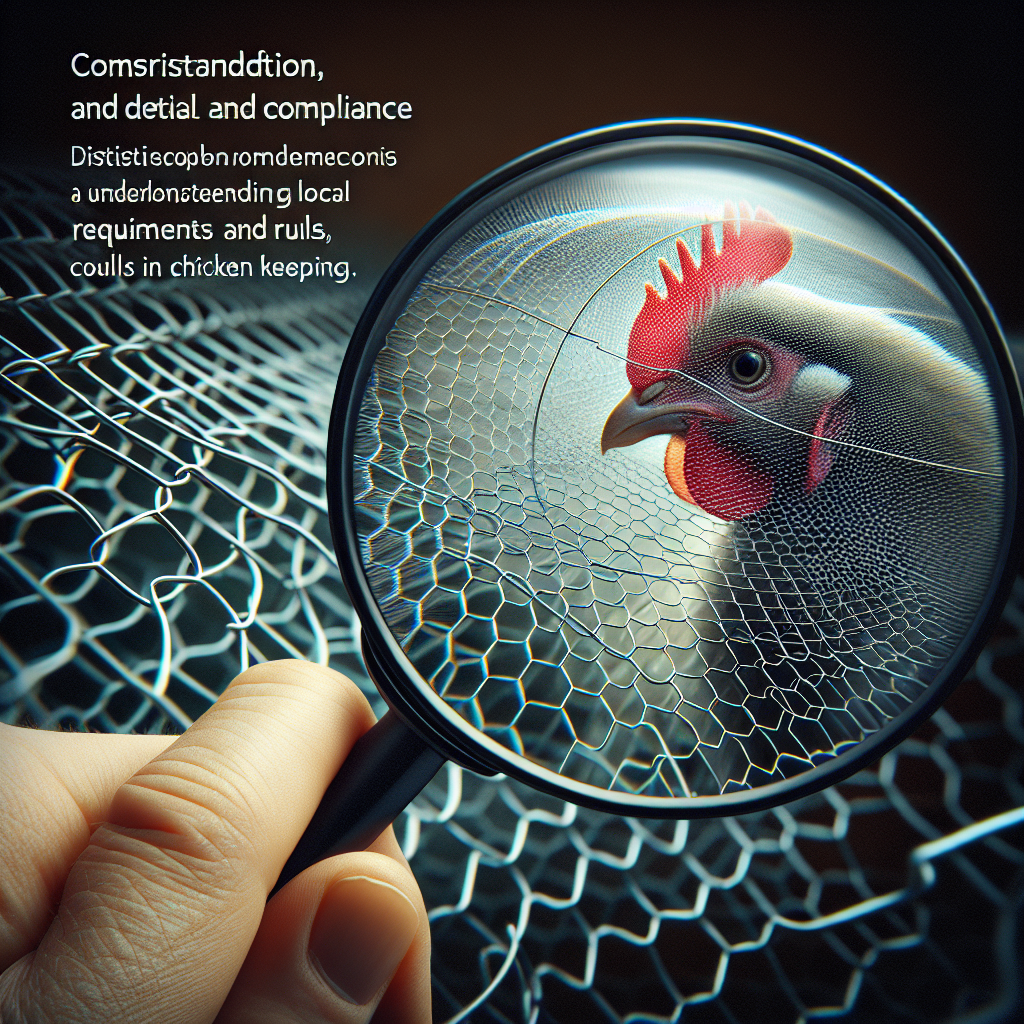So, you’ve decided to venture into the world of chicken keeping, but now you’re faced with the daunting task of understanding and navigating local regulations. Don’t worry, we’ve got you covered! In this article, we’ll break down the process of deciphering and complying with the regulations surrounding chicken keeping, so you can embark on your new hobby with confidence. From zoning restrictions to permits and licenses, we’ll provide you with all the information you need to ensure you’re on the right side of the law in your local area. So, let’s get started on your journey to becoming a responsible and knowledgeable chicken keeper!
Understanding Local Regulations
As a beginner in chicken keeping, it is important to understand and navigate the local regulations that govern the practice in your area. By familiarizing yourself with the relevant authorities, zoning and property requirements, permit and license regulations, you can ensure that you are complying with all necessary rules and regulations.
Identifying Relevant Local Authorities
The first step in understanding local regulations is to identify the relevant local authorities that govern chicken keeping in your area. This could include departments such as the local government, health department, environmental agencies, or animal control organizations. These authorities will have specific regulations and guidelines related to chicken keeping that you need to be aware of.
Researching Zoning and Property Requirements
Zoning regulations determine how land can be used in specific areas. It is important to research the zoning regulations in your area to determine if keeping chickens is allowed, and if so, what specific requirements or restrictions may apply. This can include factors such as the size of the property, setback and property line regulations, and the types of structures allowed for chicken coops.
Understanding Permit and License Requirements
Many jurisdictions require individuals to obtain permits or licenses for keeping chickens. These documents ensure that you are meeting certain standards and regulations related to housing and caring for your chickens. It is important to understand the specific permit and license requirements in your area, including any fees or inspections that may be involved.
Building and Zoning Regulations
Building and zoning regulations play a crucial role in determining the physical aspects of your chicken keeping setup. Understanding these regulations will help you to create a safe and suitable environment for your chickens.
Identifying Zoning Categories Related to Chicken Keeping
Different zoning categories may apply to chicken keeping, depending on your location. Some areas may have specific regulations for agricultural or residential zoning districts. Researching the zoning categories related to chicken keeping will help you understand any specific requirements or restrictions that may apply.
Checking Setback and Property Line Regulations
Setback regulations determine the distance between your chicken coop and neighboring properties or structures. It is important to check setback regulations to ensure that your chicken coop is positioned appropriately on your property. Property line regulations also play a role in determining the placement of your coop and may require certain distances from property lines to maintain the privacy and well-being of your neighbors.
Reviewing Coop Structure and Size Regulations
Regulations may exist regarding the size and structure of your chicken coop. These regulations are typically in place to ensure the safety and welfare of the chickens, as well as to maintain the aesthetic and environmental impact of chicken keeping in residential areas. Reviewing coop structure and size regulations will help you design and construct a coop that meets all necessary requirements.
Noise and Nuisance Regulations
Noise and nuisance regulations are in place to maintain a peaceful and enjoyable living environment for you and your neighbors. It is important to understand and comply with these regulations to avoid any conflicts or complaints related to noise, odor, or other nuisances associated with chicken keeping.
Understanding Noise Limits and Hours of Operation
Different jurisdictions may have specific noise limits or hours of operation that pertain to chicken keeping. This could include restrictions on the volume or frequency of chicken noises, as well as limitations on when certain activities related to chicken keeping can take place. Understanding these limits and hours of operation will help you ensure that your chicken keeping practices do not cause disturbances to your neighbors.
Managing Odor and Waste Disposal
Proper management of odor and waste disposal is crucial to comply with nuisance regulations and maintain a clean and healthy living environment. This includes regularly cleaning out the coop, properly disposing of waste, and potentially considering strategies to minimize odors within the coop or surrounding area.
Complying with Restrictions on Roaming
Some areas may have restrictions on allowing chickens to roam freely outside of their designated space. These restrictions exist to prevent chickens from causing damage to neighboring properties, gardens, or public spaces. It is important to comply with these restrictions and ensure that your chickens are contained within appropriate boundaries.
Health and Safety Regulations
The health and safety of your chickens should always be a top priority. Understanding and complying with health and safety regulations will help you maintain a healthy flock and prevent the spread of diseases.
Learning About Biosecurity Measures
Biosecurity measures are protocols designed to prevent the introduction and spread of diseases within a flock. By implementing biosecurity measures, such as proper sanitation, quarantine procedures, and limiting flock exposure to outside sources of diseases, you can reduce the risk of illness and promote the overall health of your chickens.
Identifying Disease Prevention and Reporting Requirements
Different jurisdictions may have specific disease prevention and reporting requirements for chicken keepers. This could include mandatory vaccination programs, regular health inspections, or reporting any signs of illness or disease within your flock. Familiarize yourself with these requirements to ensure that you are meeting all necessary obligations.
Implementing Proper Waste Management Systems
Proper waste management is essential for maintaining a clean and healthy living environment for your chickens. This includes regular cleaning of the coop, proper disposal of waste, and potentially implementing composting or other waste management systems. By implementing proper waste management systems, you can prevent the spread of diseases and minimize the impact of chicken keeping on the surrounding environment.
Animal Welfare Regulations
As a chicken keeper, it is important to prioritize the welfare of your chickens. Understanding and complying with animal welfare regulations will ensure that your chickens are provided with proper care, living conditions, and treatment.
Understanding Minimum Space Requirements and Flock Size Limits
Different jurisdictions may have specific regulations regarding minimum space requirements and flock size limits. These regulations are in place to ensure that chickens have enough space to move, forage, and engage in natural behaviors. Understanding these requirements will help you provide an appropriate living environment for your chickens.
Complying with Requirements for Food, Water, and Shelter
Providing adequate food, water, and shelter are essential aspects of proper chicken care. Animal welfare regulations may outline specific requirements for these elements, such as the types of feed or waterers to be used, the provision of suitable shelter, and the cleanliness and accessibility of these resources. Complying with these requirements will ensure that your chickens are provided with the necessary provisions for their well-being.
Ensuring Proper Care and Treatment of Chickens
Animal welfare regulations may also outline specific requirements for the care and treatment of chickens. This can include guidelines for handling, transportation, and medical treatment. By ensuring proper care and treatment of your chickens, you are promoting their health and well-being while also adhering to legal requirements.
Permit Application Process
In order to comply with local regulations, you may need to apply for permits or licenses. Understanding the permit application process will help you navigate through the necessary steps and ensure a smooth application process.
Gathering Necessary Documentation
Before submitting a permit application, it is important to gather all necessary documentation. This could include site plans, coop designs, proof of property ownership, or other supporting documents required by the local authorities. Ensuring that you have all the required documentation ready will prevent any delays in the application process.
Submitting Permit Application
Once you have gathered all the necessary documentation, you can submit your permit application to the relevant local authorities. This typically involves completing an application form, paying any required fees, and providing all supporting documents. It is important to follow the instructions provided by the local authorities to ensure that your application is properly submitted.
Responding to Any Requests for Additional Information
During the permit application process, the local authorities may request additional information or clarification regarding your application. It is important to respond to these requests promptly and provide any requested information or documents. This will help to prevent any delays or issues with your application.
Enforcement and Penalties
Understanding the potential penalties for non-compliance with local regulations is essential for every chicken keeper. By adhering to the regulations, dealing with complaints and inspections, and knowing your rights, you can navigate any potential enforcement actions effectively.
Understanding Potential Penalties for Non-Compliance
Different jurisdictions may have varying penalties for non-compliance with local regulations. These could include fines, legal action, or even the removal of your chickens. Understanding the potential penalties will motivate you to comply with the regulations and avoid any unnecessary repercussions.
Dealing with Complaints and Inspections
If a complaint is made regarding a violation of local regulations, it is important to respond in a prompt and respectful manner. Cooperating with the local authorities during the investigation process and addressing any non-compliance issues will help to mitigate the impact of the complaint. Regular inspections may also be conducted to ensure ongoing compliance with regulations.
Appealing Decisions or Fines
If you disagree with a decision or receive fines related to non-compliance, you may have the right to appeal. Familiarize yourself with the appeal process and any relevant deadlines to exercise your rights effectively. Seeking legal advice in such situations may be beneficial to navigate the appeals process.
Additional Resources
As a beginner in chicken keeping, there are additional resources available to support your understanding of local regulations and practices. These resources can provide valuable guidance and advice.
Contacting Local Extension Office or Agricultural Department
Local extension offices or agricultural departments often have staff who specialize in poultry or livestock management. Contacting these offices can provide access to expert advice and resources specific to your area. They can guide you on local regulations and best practices for chicken keeping.
Joining Local Chicken Keeping Groups or Forums
Joining local chicken keeping groups or forums can be a great way to connect with experienced chicken keepers in your area. These groups or forums often promote knowledge sharing, provide guidance on navigating local regulations, and offer support to beginners in the hobby. By joining these communities, you can learn from the experiences of others and gain practical insights.
Consulting Legal Professionals If Needed
If you have specific legal questions or concerns related to local regulations, it may be advisable to consult with a legal professional. They can provide tailored advice based on your individual circumstances and help you navigate any legal complexities that may arise.
Conclusion
As a beginner in chicken keeping, understanding and navigating local regulations is crucial for a successful and compliant chicken keeping experience. By identifying relevant local authorities, researching zoning and property requirements, and understanding permit and license regulations, you can ensure that you are adhering to all necessary rules and regulations.
Building and zoning regulations, noise and nuisance regulations, health and safety regulations, and animal welfare regulations all play a role in creating a safe and suitable environment for your chickens. Familiarizing yourself with these regulations and complying with their provisions will help you provide the best care for your flock.
Navigating the permit application process, understanding enforcement and penalties, and utilizing additional resources such as local extension offices or chicken keeping groups can further support your understanding of local regulations. Remember, consulting legal professionals when necessary can provide valuable guidance to ensure compliance with the law.
By taking the time to understand and navigate local regulations as a beginner in chicken keeping, you will be well-prepared to create a thriving and compliant chicken keeping experience.




